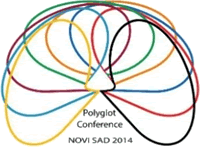There are various polyglot activities scheduled for this afternoon and evening, and talks and lectures start tomorrow, so I have this morning free. I plan to do a bit of work on Omniglot, and will try to meet up with other people who are here for the conference.
Unlike in Berlin, where most people stayed in a large hostel and the polyglot gathering was in the same place, here in Novi Sad things are a bit more spread out – we are staying in various hotels around the city and the conference is taking place in a cultural centre. My hotel doesn’t have a restaurant and breakfast is available at a café round the corner.
It seems that smoking is permitted inside in some places here – ugh! Since the smoking ban came into force in the UK I’ve tried to avoid visiting places where indoor smoking is still allowed. I didn’t check before coming here and might not have come if I’d known. At least the weather is warm and sunny so I can sit outside and avoid most of the smoke.
I’ve spoken a bit of Serbian so far, and found that some people in hotels and restaurants speak English as well. Last night I shared a taxi from Belgrade to Novi Sad with one of the other conference participants – a Polish guy with Vietnamese roots. We talked mainly in French, with a bit of Spanish, English and Russian thrown in for good measure. The taxi driver spoke only Serbian, plus a bit of Russian and German, and I struggled to explain to him that one of the people who was supposed to be with us had missed his connection in Zurich, due to a delayed flight from London, and would be arriving later.
